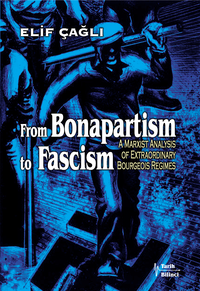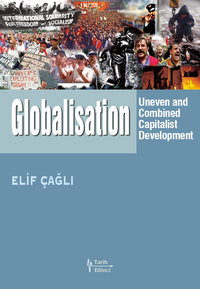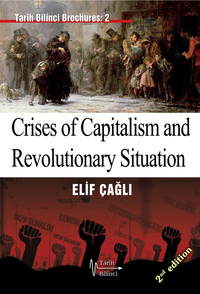Within the context of debates on the national question, Lenin paid great attention to the distinction between just and unjust wars. It was indeed very important because of the war conditions of that period to make this distinction and a prerequisite for communists to take the right attitude against wars. The declaration, adopted unanimously in Basel Congress of the Second International in 1912, is particularly important in this context. In this declaration, imperialists’ preparations for a war of plunder were exposed and workers were called for struggling against the threat of war. The idea that this state of war indicated a state of revolution at the same time was generally accepted. Should the war break out, the task of the parties and socialists affiliated to the Second International was to make use of this economic and social crisis for realizing socialist revolution. But when the imperialist war broke out in 1914, most of the socialists who had signed the Basel declaration, broke their word, voted for war budgets in their parliaments, and took sides with their bourgeois governments.
The renegades of the Second International, in an attempt to justify their attitude, held on to the lie that even aggressor European countries that started the imperialist division war had the right to “defend the fatherland”. Struggle against this political tendency, namely social-chauvinism in political literature, became a burning question. Therefore, it was a necessity to reassert the distinction between just and unjust wars under conditions of imperialist stage of capitalism.
In order to identify the character of a war, one must, above all, clearly identify the character of the policy causing the war. Since every war is nothing but the continuation of politics by other means. And there cannot be an abstract criterion for judging the character of a war and deciding if it is just or unjust.
However, to give an example, French socialists, whose record were remarkably stained for praising “patriotism” in the name of socialism (famous Jaurésism), acted in harmony with their “fame” during the imperialist division war. They could act on the criterion “an attacked country has the right to defence” in the war of competition and re-division of the spheres of influence among imperialist countries. In his criticism of these kinds of chauvinist approaches, Lenin pointed out the very essence of the question; “As if the question were: Who was the first to attack, and not: What are the causes of the war? What are its aims? Which classes are waging it?”[1]
While “defence of the fatherland” can have a just and progressive character only under certain historical conditions, its application to a war between imperialists is nothing but deceiving workers and siding with the reactionary bourgeoisie. To expose the deceitfulness of social-chauvinists it is necessary to remember, above all, why Marx and Engels considered national liberation wars between 1789-1871 progressive, just and supportable:
When, in speaking of the wars of such periods, socialists stressed the legitimacy of “defensive” wars, they always had these aims in mind, namely revolution against medievalism and serfdom. By a “defensive” war socialists have always understood a “just” war in this sense (Wilhelm Liebknecht once expressed himself precisely in this way). It is only in this sense that socialists have always regarded wars “for the defence of the fatherland”, or “defensive” wars, as legitimate, progressive and just.[2]
But the war that broke out in 1914 was an unjust war started by imperialist countries to re-divide the world. Striving to impose the idea of “defence of the fatherland” on the proletariat of imperialist countries meant directly aiding the imperialist powers. In Lenin’s words, “It is in this way that the peoples are being deceived with ‘national’ ideology and the term ‘defence of the fatherland’, by the present-day imperialist bourgeoisie, in the war now being waged between slave-holders with purpose of consolidating slavery.”[3]
These kinds of wars are neither just nor defensive wars for the proletariat of those capitalist countries fighting each other to share spheres of influence. For a war of that type there is no sense in asking who attacked first. Because both the “attacking” and “attacked” sides are the sides of a conflict of imperialist interests and therefore the proletariat cannot have a problem like “the defence of the fatherland” in this war. The proletariat is not part of a settling of accounts between capitalist countries challenging each other to gain a more advantageous position against others. For proletarians of capitalist countries involved in war, the question is to wish for the defeat of their “own” government and turn the imperialist war into a civil war which will end the bourgeois order. Proletarians who are armed due to war conditions must take it as their fundamental class task to point their guns to their own bourgeois governments.
Replacing this policy with the policy of “defence of the fatherland” is a naked betrayal to the proletarian revolution. Because in countries waging war for imperialist purposes, the proletariat’s involvement in this war with the illusion of “defence of the fatherland” means slaughtering other counties’ proletarians for the sake of its “own” bourgeoisie’s victory. This attitude is obviously trampling on the principle of proletarian internationalism expressed as “workers of all countries, unite”. Just as Lenin said:
Anyone who today refers to Marx’s attitude towards the wars of the epoch of the progressive bourgeoisie, and forgets Marx’s statement that “the workers have no country” – a statement that applies precisely to the period of the reactionary and outmoded bourgeoisie, to the epoch of the socialist revolution, is shamelessly distorting Marx, and is substituting the bourgeois point of view for the socialist.[4]
However, opposition to the policy of “defence of the fatherland” does not justify rejecting, or denying the possibility of, any national wars, which means swinging to another extreme. The situation about colonies and oppressed nations that are subject to division in an imperialist war is different. This is because in these countries “defence of the fatherland” contains the solution of a belated historical question, that is, of national independence question. And communists continue to consider wars for national liberation arising on this basis just and progressive. After pointing out that “the fatherland and nation” are historical categories, Lenin says; “I am not at all opposed to wars waged in defence of democracy or against national oppression, nor do I fear such words as ‘defence of the fatherland’ in reference to these wars or to insurrections.”[5] Indeed, socialists always take sides with the oppressed and do not oppose wars waged against capitalist oppression with democratic or socialist content. In order to recognise a national war as a just one, its substance must first be identified.
How, then, can we disclose and define the "substance" of a war? War is the continuation of policy. Consequently, we must examine the policy pursued prior to the war, the policy that led to and brought about the war. If it was an imperialist policy, i.e., one designed to safeguard the interests of finance capital and rob and oppress colonies and foreign countries, then the war stemming from that policy is imperialist. If it was a national liberation policy, i.e., one expressive of the mass movement against national oppression, then the war stemming from that policy is a war of national liberation.[6]
There is not much controversy on that wars waged by oppressed nations for national liberation in colonial countries are just wars. What must be discussed is the situation when a capitalist country which has political independence and is already ruled by the bourgeoisie becomes the subject of an imperialist division war, and is occupied by another one. Can we still talk about a just national war in this situation? Should communists, in the name of not sinking into social-chauvinism, be indifferent to the struggle of revolting toiling masses for “defence of the fatherland” under these conditions?
First of all, it must be made clear that in case of an occupation or annexation of the territory of a sovereign nation state, the fundamental question for the communist approach is not whether to defend the land or not. Against an attack or annexation of the land where the working class and toiling masses live, the questions to be answered are: what is to be defended, how, against whom, for what, on what basis? As expressed in Lenin’s attitude, what communists oppose in “defence of the fatherland” is that the proletariat was driven into a position of defending and supporting the bourgeois rule in its own country under the pretext of war. And what is the correct attitude then?
The Paris Commune which passed into the history of revolutionary struggle of the world working class as an early experience in the context of “seizure of power” provides us with an early example of this subject as well. While defending Paris against the Prussian army, Communards, who “were ready to storm the heavens” in Marx’ words, did not run to the service of the bourgeois Versailles government. On the contrary, while pushing back the armies of invasion, they established their own rule. The Paris proletariat was too young in terms of political experience. It did not yet win the support of the toiling masses, it was isolated. It did not know what to do, made some mistakes and was defeated in the end. But, despite everything, it showed us an example of the capability of the proletariat armed against the attack of an occupying army to put an end to the rule of its class enemy inside while fighting foreign invaders.
Politically inexperienced Paris proletariat was not yet distorted with the strategies of rotten Stalinist “leaders” of later periods, who divided working-class consciousness into endless stages (first struggle together with the bourgeoisie against foreign enemy and then comes the time for struggle against the bourgeoisie, which means never!). Yet, it was still kind of a pre-experience; its shortcomings and mistakes were not to be ignored. Thus Lenin noted the mistakes of the Paris Commune as lessons to be learned. He pointed out that part of Paris workers was plagued by “national ideology”, which was an example of petit-bourgeois illusions leading to vital mistakes.
Another example to remember is the case of “national question” that arose in Belgium when it was occupied by Germany during the First World War, which is different from the case of colonial countries. Lenin discussed whether there could be a national war even in a capitalist country like Belgium if Germany occupied it and whether then communists would consider it just or unjust? He maintained that annexations must be opposed and the right to national self-determination must be acknowledged in these kinds of situations as well. Because he was against the mindset of those who consider forceful land annexations “de-facto” situations and take the attitude of indifference in these kinds of changes of border in the name of political-economic centralization which is supposed to pave the way for socialism. That is why he criticized Polish Marxists who were saying “We are absolutely opposed to erecting new border stones in Europe and reconstruction of those destroyed by imperialism”. He considered this justification of annexations a degeneration of Marxism. Maintaining that fusion of nations could only be accomplished on the basis of freewill Lenin stood firm in his position that forceful annexations without the will of people must be opposed. He reminded that even in a country which has resolved the question of independence long time ago –as in the case of Belgium–, defence of national self-determination might come into agenda again.
It would be useful to highlight some important points to clarify the subject. Historically, a “national war” in Belgium had nothing in common with national liberation wars in colonial countries. Belgium’s conditions were completely different from colonial countries. The bourgeoisie in a country like Belgium would not suddenly stop being a reactionary class and long-time enemy of the proletariat and gain a relatively “progressive” character just because of an occupation or annexation. Therefore, for these kinds of “national questions” which may occur in capitalist countries, communists’ task is to advocate the right to self-determination in the example of Paris Commune, that is, to connect resolution of these kinds of questions to the proletarian revolution. Thus, an occupation or annexation in a capitalist country brings forth the task of the proletariat to establish its revolutionary hegemony under conditions of war. So, the proletariat must be able to make use of the circumstances that drive the toiling masses to a national revolt, gain the leadership of masses rising for the “defence of the fatherland”, and lead them to social revolution.
In today’s world, various disputes and conflicts for interests between major capitalist countries and small ones are also taking place, but this has nothing to do with the struggle between the oppressed and oppressor nations. In order to avoid any misunderstandings, in our view it is an established fact that the toiling masses in relatively smaller and weaker countries are oppressed multiply because of the interventions and pressures by imperialist countries. But, now we have a highly developed nation divided with deep class antagonisms, which is completely different from the conditions of colonial countries where the bourgeoisie could play a progressive role against primitive and reactionary pre-capitalist formations. Now we have capitalist states in front of us with their own political institutions and apparatuses of bourgeois rule. The former question of “the oppressor and oppressed nation” left its place to “oppressor and oppressed class” under the capitalist state. But the question of taking a correct attitude against wars started by imperialist countries in their competition and struggle for hegemony to re-divide spheres of influence still maintains its importance.
For instance, is it possible to remain neutral on the question of Iraq where the US, in its growing aggressiveness, is obviously getting prepared for a vicious attack before the eyes of the whole world? Although there is nothing to support in Saddam’s regime, the proletariat has to wage a struggle against imperialist war on a world scale. Without opposing the preparations of American imperialism for an evidently unjust war, it is impossible for the working class to win the toiling masses to its own revolutionary objective neither in Iraq nor in any other country. It would be a great crime not to take an attitude against imperialist war threats and imperialist wars. In the case of a possible war or an US occupation of Iraq, the war of Iraqi people against American imperialism would of course be a just national liberation war. Similarly, it goes without saying that, in the Middle East, Palestinian people’s national liberation war is just against Israel’s unjust war to repress Palestinian people ruthlessly.
True, communists advocate national self-determination, oppose military interventions and annexations by imperialist countries. They consider oppressed nations’ struggles for political independence just and support them. But in all capitalist countries, communists’ main concern is to utilise revolutionary situations caused by war in the direction of the proletarian revolution. Struggle against military interventions of imperialist states is to be waged not with a view to promoting “national unity” with the bourgeoisie or consolidating bourgeois governments, but accomplishing the social revolution. Therefore, in all countries under bourgeois rule, communists have to be extremely watchful in case of a war and take saving the working class from the chains of bourgeois “national ideology” as their fundamental duty. As the case of Iraq clearly reveals, the way to get rid of imperialist powers’ unjust and atrocious military interventions does not lie in supporting bourgeois governments playing the “victim”, which leads eventually to survival of their rule. In the face of an unjust imperialist attack, which brings forth the right to self-determination of the attacked country, the task of the revolutionary proletariat is in no way limited to recognising this right. On the contrary, the real task begins at that point. Because, even in just defensive wars in which the working masses, the majority of the nation, take upon the armed struggle to death to save the country from occupation, the bourgeoisie has only one goal: none but to protect its own order and consolidate it! This is what the ruling bourgeoisie understands from the right to self-determination, nothing more! So, the task of the revolutionary proletariat waging its struggle under these conditions is to win the leadership of the nation and pave the way for the toiling masses to determine their own destiny. Under conditions of hot war, in all capitalist countries workers must come forward to turn imperialist wars into civil wars and end bourgeois rule in their own country.
There is one question that needs to be highlighted here: if a major imperialist state attacks a smaller capitalist state (as in the Gulf War in which the US attacked Iraq), the victory of relatively smaller capitalist state (you can read it as the victory of Saddam) is said to be a blow to imperialism. According to this approach, the position of the major capitalist state would be shaken because of the defeat, and this would create important possibilities for the struggle of the proletariat. These kinds of speculative considerations underestimate manoeuvring capabilities of imperialist powers and overlook the indispensability of international organization and struggle of the proletariat. In fact, these kinds of attitudes are extensions of a deformed understanding of anti-imperialism.
Even if an imperialist country’s adventure in a small country that results in defeat might boost the working masses’ morale on a world scale, one should not make a one-dimensional assessment and this possibility should never be exaggerated. Without having a revolutionary leadership and organization on an international level, it would be a great mistake to expect these kinds of situations to spontaneously create big opportunities for the struggle of the working class. Actually, there is an important point overlooked on the question of major states/small states. Major imperialist powers have indeed a great capacity for manoeuvre so that they can, for instance, even present an adverse situation for them as a “victory” in their military operations carried out for spheres of influence and regional wars instigated by them. But the bourgeois government in the smaller capitalist country subject to military intervention may indeed be shaken by a defeat. In short, in today’s world, those who are swung to a so-called anti-imperialism by saying “support the smaller bourgeoisie against bigger” in regional wars which are provoked by imperialists also disregard revolutionary situations arising in the countries under attack. And in fact what fundamentally scares all imperialist states is not a small capitalist country challenging a major one; but a proletarian revolution breaking out in any capitalist country, no matter how big it is.
We can conclude this discussion by approaching the subject from a different angle. Overwhelming majority of colonial and semi-colonial countries of Lenin’s time gained their political independence, thus joining the family of capitalist states by establishing their own nation state. As with Turkey, India and other similar examples, some of these countries even made quite a long way in terms of economy compared to others. Although they are in lower ranks of the imperialist hierarchy, they set about to become regional powers and tease other countries around as they become stronger. Therefore, in order to adopt a correct attitude towards today’s wars, it is necessary to take into account the concrete conditions of the world we live in today and changing conditions in comparison with yesterday.
We should not forget that major imperialist countries are not alone in embarking on expansionist adventures. Today, the situation of capitalist countries (like Turkey, India or Iran) which strive to be an imperialist in their region, a sub-imperialist power, is striking. There are skirmishes, reactionary adventures and unjust wars provoked by these countries to create their sphere of influence in their region. The attitude of the proletariat cannot be to wage a “national” or a “fatherland” war in the same front with its “own” bourgeoisie against another one. Because of concrete conditions, Lenin’s warnings made in the context of condemning social-chauvinists of imperialist countries, must be kept in mind by communists of all capitalist countries today. It is downright nationalism and social-chauvinism to justify, under the pretext of “defence of the fatherland,” involvement in a war under bourgeois hegemony for the purpose of strengthening the armies of bourgeois states that drive their nation into unjust wars in their expansionist adventures.
[1] Lenin, “An Open Letter to Boris Souvarine”, CW, Vol. 23, p.198
[2] Lenin, “Socialism and War”, p.300
[3] Lenin, ibid, p.301
[4] Lenin, ibid, p.309
[5] Lenin, “An Open Letter to Boris Souvarine”, p.196
[6] Lenin, “A Caricature of Marxism”, p.33
link: Elif Çağlı, Imperialist era and the distinction between just and unjust wars, August 2002, https://enternasyonalizm.org/node/598






